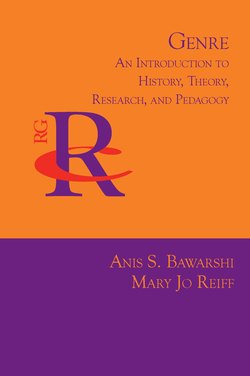Читать книгу Genre - Mary Jo Reiff - Страница 15
На сайте Литреса книга снята с продажи.
Оглавление5 Genre in Rhetorical and Sociological Traditions
At the end of Chapter 4, we began to draw some general distinctions between linguistic (particularly English for Specific Purposes) and rhetorical genre approaches, having to do with differences between their communicative and sociological emphases, and with the extent to which genres can and should be taught explicitly. Both linguistic and rhetorical approaches to genre—whether in the form of Systemic Functional Linguistics, English for Specific Purposes, or Rhetorical Genre Studies—share a fundamental understanding of genre as inextricably tied to situation. As Aviva Freedman recently put it, “both insist on the limitations of traditional conceptions of genres which focused only on recurring textual features. Both stressed the need to recognize the social dimensions of genre. . . . Both approaches emphasize the addressee, the context, and the occasion” (“Interaction” 104). Yet while both linguistic and rhetorical genre approaches recognize genres as connecting texts and contexts, the point of emphasis and analytical/pedagogical trajectory of each approach has differed, as Freedman and others have noted (see especially Hyon, “Genre in Three Traditions”; also Hyland, “Genre-Based Pedagogies” and Paltridge, Genre and the Language Learning Classroom), and these differences have had significant implications for how each tradition recognizes the work that genres do, how genres can be studied, and the ways genres can be taught and acquired.
In the case of English for Specific Purposes (ESP) and Rhetorical Genre Studies (RGS), the differences in emphasis and trajectory can be traced to each field’s guiding definitions of genre and the traditions that inform them. Following John Swales, ESP genre approaches have generally defined genres as communicative events which help members of a discourse community achieve shared communicative purposes. As such, genres are forms of communicative action. Within RGS, and following Carolyn Miller, genres have been defined as forms of social action. The next chapter will explore in greater detail what it means to think of genres as forms of social action and its implications for the researching and teaching of genres within RGS. But first, in this chapter, we will compare RGS’s and ESP’s guiding definitions of genre in order to clarify their communicative and sociological emphases. Then we will situate RGS’s guiding definition of genre within the rhetorical, phenomenological, and sociological traditions from which it grew. We will conclude the chapter by describing recent genre scholarship in Brazil, which has synthesized the sociological, rhetorical, and linguistic traditions (while also drawing on French and Swiss genre pedagogic traditions) in ways that reveal the possible interconnections between these traditions.
Communicative and Sociological Orientations to Genre
Within ESP genre approaches, the aims of genre analysis have generally been to examine what a discourse community’s goals are and how genre features (structurally and lexico-grammatically) embody and help its members carry out their communicative goals. Thus, as generally understood in ESP genre research, it is communicative purpose (defined in relation to a discourse community’s shared goals) that both gives rise to and provides the rationale for a genre, and shapes its internal structure. It is communicative purpose that often serves as a starting point for ESP genre analyses, which then proceed toward an analysis of a genre’s rhetorical moves and steps, then to textual and linguistic features that carry out the moves and steps. Because ESP approaches have tended to define genres as forms of communicative action that help members of a discourse community carry out its work, the trajectory of inquiry has tended to go from context to text. That trajectory has been used to great effect by scholars and teachers to help, in particular, graduate-level, international, non-native speakers of English gain access to and participate more effectively within various academic contexts by explicating and teaching the genres that coordinate the work of these contexts. Significantly, such an internal, linguistic trajectory has tended to take the existence of a discourse community and its goals as a given—a starting point for the identification and analysis of genres.
